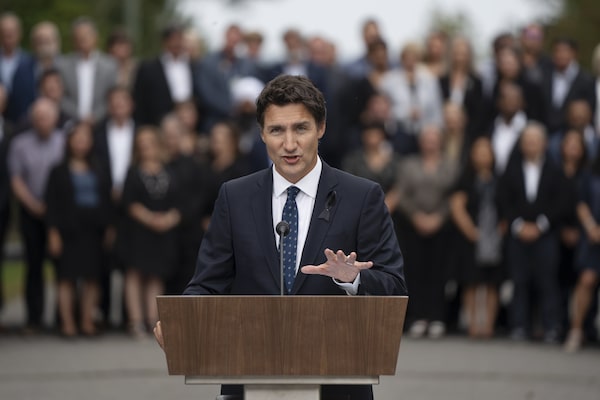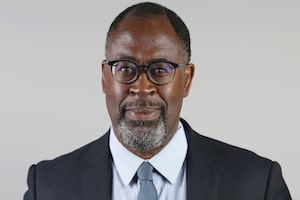
Prime Minister Justin Trudeau makes a speech as Liberal MPs look on during a Liberal caucus retreat in St. Andrews, N.B., on Sept. 12.Darren Calabrese/The Canadian Press
Prime Minister Justin Trudeau and new Conservative Leader Pierre Poilievre each described the other as economically irresponsible Monday, in a pair of duelling speeches to their respective caucuses ahead of the resumption of Parliament later this month.
Mr. Poilievre addressed his caucus as Leader Monday in Ottawa with a speech that focused heavily on economic themes and criticized the Trudeau government for doubling the size of the national debt. He called on the Liberals to promise they would not hike taxes.
“I am issuing a challenge to Justin Trudeau today. If you really understand the suffering of Canadians, Mr. Prime Minister, if you understand that people can’t gas their cars, feed their families or afford homes for themselves – if you really care, commit today that there will be no new tax increases on workers and on seniors. None,” he told caucus members.
What Pierre Poilievre has to do next as new Conservative leader
In his first public comments since Mr. Poilievre’s decisive Saturday night leadership victory, Mr. Trudeau laid out his criticisms of the Tory Leader during an outdoor speech to the national Liberal caucus, which is gathering in St. Andrews, N.B., for three days of meetings ahead of Parliament’s return.
“What Canadians need is responsible leadership,” Mr. Trudeau said. “Buzzwords, dog whistles and careless attacks don’t add up to a plan for Canadians. Attacking the institutions that make our society fair, safe and free is not responsible leadership. Telling people they can opt out of inflation by investing their savings in volatile cryptocurrencies is not responsible leadership. By the way, anyone who followed that advice would have seen their life savings destroyed.”
Mr. Trudeau was referring to comments Mr. Poilievre made in March at a leadership campaign stop. At the time, Mr. Poilievre said cryptocurrencies “let Canadians opt out of inflation.” He also said he would, if he were to form government, fire Bank of Canada governor Tiff Macklem.
The value of bitcoin, the most popular form of cryptocurrency, has dropped by more than 50 per cent since Mr. Poilievre made those comments.
Mr. Trudeau spoke after Mr. Poilievre’s speech, but he did not directly address the Conservative Leader’s comments about taxes. Neither Mr. Trudeau nor Mr. Poilievre took questions from reporters Monday.
Mr. Trudeau congratulated Mr. Poilievre on his victory and said Liberals are open to working with other parties in Parliament.
“But this doesn’t mean that we’re not going to be calling out highly questionable, reckless economic ideas,” he said.
Liberal MPs have been meeting for informal discussions with various cabinet ministers, as well as in smaller groups such as regional caucuses, and with the full national caucus.
The Liberal caucus gathering is taking place just days before the House of Commons resumes sitting after the summer recess. Various ministers this week have signalled that the government’s fall priorities will include gun-control legislation and affordability measures aimed at lower-income Canadians, along with a suite of bills dealing with new regulations for the internet in areas such as promoting Canadian content and curbing hate speech.
In his speech, Mr. Poilievre said the Conservatives will work with any party on advancing the interests of Canadians, but he added that the Official Opposition would not support any new tax increases.
“And we will fight tooth and nail to stop the coalition from introducing any,” he said, referring to the NDP and Liberals.
The NDP is supporting the Liberals on key votes in Parliament in return for government action on NDP priorities such as dental care. But the agreement is not a formal governing coalition, because NDP MPs are not part of cabinet.
Mr. Poilievre, a 43-year-old seven-term Ottawa-area MP and former cabinet minister under former Conservative prime minister Stephen Harper, told the national Conservative caucus that he was grateful for all of their contributions, regardless of who they supported in the leadership race. The campaign began in February when the caucus voted out former leader Erin O’Toole.
On Monday, ahead of the national caucus meeting, Mr. Poilievre met with members of the party’s Quebec caucus. Most Quebec Conservative MPs endorsed Jean Charest in the leadership race.
Conservatives declined to comment on the proceedings in detail.
“It was a fantastic meeting. We’re fully united,” Quebec MP Pierre Paul-Hus, who backed Mr. Poilievre, said Monday after the caucus meeting.
“Everything is fine.”
Even though the Liberals and the NDP voted earlier this year to continue permitting hybrid sittings of the House of Commons, which have allowed MPs to participate virtually in debates and votes since the start of the pandemic, the full Liberal caucus meetings this week are all in person.
While speaking with reporters, Government House Leader Mark Holland was asked why the Liberals support the continuation of a virtual Commons, but do not offer that option in their own caucus meetings.
He said the parliamentary Commons committee on procedure and House affairs will be conducting a review of the hybrid system this fall to determine if any changes should be made. He added that he will be making his own recommendations.
As the Official Opposition, the Conservatives have been very critical of the hybrid Parliament, saying it reduces accountability.
“I spent a lot of time in opposition. I am incredibly sympathetic to making sure that the mechanisms of accountability are there,” Mr. Holland said. “Now that we’re ... moving out of this pandemic and moving to brighter, clearer days, let’s take an opportunity to reflect on what worked and what didn’t work in this experiment.”
Mr. Holland and other Liberal MPs delivered a common criticism of Mr. Poilievre’s political style, accusing him of proposing simplistic solutions to complex problems.
Thunder Bay-Rainy River MP Marcus Powlowski said he expects that Mr. Poilievre’s support for the self-described freedom convoy protests, which brought central Ottawa to a virtual standstill for weeks earlier this year and also briefly shut down some border crossings, will limit his political appeal.
“I think a lot of Canadians are going to see him on the far right. I think a lot of his opinions are not, but he’s also catered to the far right – the kind of people that park their trucks in downtown Ottawa, the freedom convoy and that kind of people,” he said. “And I think the majority of Canadians, the many quiet Canadians, don’t agree with that.”
 Bill Curry
Bill Curry Ian Bailey
Ian Bailey